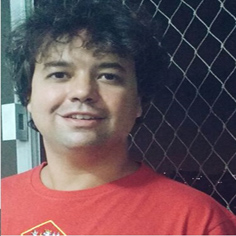Permanent Professor
Adjunct Professor I of the Social Communication course of the Institute of Art and Social Communication of the Fluminense Federal University. Permanent Professor of the Postgraduate Program in Media and Daily Life (PPGMC). Vice-pedagogical coordinator of the Laboratory of Research in Community Communication and Social Advertising (LACCOPS). Vice-coordinator of the Communication for Citizenship of Intercom. Doctor (2015) and Master (2008) in Communication Sciences, research line of Communication, Culture and Citizenship, by the School of Communications and Arts of the University of São Paulo (ECA-USP). He currently holds a Post-doctorate in Cultural Studies from the Advanced Program of Contemporary Culture (PACC) of the Federal University of Rio de Janeiro (UFRJ). Graduated (2001) in Social Communication-Advertising and Propaganda by the Methodist University of the State of São Paulo (UMESP). During graduation, in partnership with students from other areas, he idealized the creation of the Mother Earth Institute, which developed social and environmental education and activism in Praia Grande, south coast of São Paulo. He has published chapters of books, articles and participated in congresses, seminars, meetings and research groups on communication, culture, popular communication, popular cultures, hegemony and politics, with emphasis on research on social movements. She has professional experience mainly in the areas of Campaign Planning and Advertising Copywriting, working in a communication agency and in the third sector.
Research Project
Hegemony, media and daily life
This research has as main objective to generate theoretical and empirical subsidies to the contemporary debates about the relations between hegemony, counter-hegemony, popular hegemony, education, information, culture, media and daily life. The study selects, relates and analyzes texts of authors who formulated the concepts of hegemony and counter-hegemony, and who thought the relations between education, culture, media and daily life from political praxis and dialogue with Marxian theory, in the light of historical transformations, singular and universal, local and global, from modernity to contemporaneity. The new spatiotemporal configurations begin to shape a daily life often marked by the great speed of material and symbolic transformations, by the omnipresence of global consumer referrals, in a movement made possible by the new information and communication technologies (ICTs). The production of space follows the logic of commodity production, thus fetishizing, dissimulating social relations and production. We are interested primarily in understanding how social movements and other collective subjects organize and deal critically with respect to power disputes in the contemporary world, involving the media of the dominant historical bloc, the information regime, class alliances, and how they develop their processes of popular, community and citizen communication in networks and on the streets.
Lattes: http://lattes.cnpq.br/1667118409899449
E-mail: pablobastos2id.uff.br








